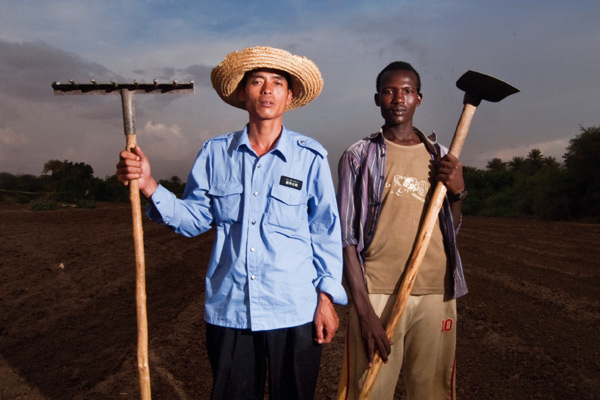It’s a new version of the Yellow Peril. The Chinese are taking over the world, starting with the nasty bits, like Burma, Sudan and Iran, which we are boycotting for all kinds of high-minded reasons. Two Spanish journalists, Juan Pablo Cardenal and Heriberto Araújo, have returned from an exhausting trip round the globe to tell us how it’s being done. After carrying out 500 interviews, the authors seem outraged by the corruption and environmental devastation they witness, but also awed by the sheer guts and industry that individual Chinese show in doing business where so many others fail.
The authors believe that something is going on in the global economy that is altogether different, bigger and possibly uglier than anything seen before. The first waves of Chinese emigration took place in the autumn of the Qing dynasty when indentured labourers were shipped out to mine gold in California or Australia; they also built railways in the Wild West and in Malaya tapped rubber trees or mined tin. This influx alarmed some countries so much that they restricted further Chinese immigration for generations.
In Southeast Asia, the Chinese continued to arrive in the first half of the 20th century, often as penniless coolies, but they died as millionaires. They have taken control of the trade and commerce of Indonesia, Thailand, Malaysia, Singapore and the Philippines. There have been periodic attempts to expel them by the Burmese and Vietnamese, and Malaysia still discriminates against its ethnic Chinese citizens because they are too successful.
Could the same pattern repeat itself globally? These days the Chinese are turning up in places like Egypt, the Congo, Mozambique, Russia’s far east, the oil-rich steppes of Central Asia, the Middle East and Central America. Some are also starting out as penniless coolies, building roads, railways and pipelines, or felling forests. Others are like the 25,000 Chinese women in Cairo who go door-to-door selling clothes that they have sewn in tiny workshops.
The authors have penned engaging and sympathetic portraits of some of the 750,000 Chinese who have set up retail businesses all over Africa selling the flood of consumer goods that pours out of China’s factories. They visit some of the new Chinatowns springing up like the Dragon Mart emporium in Dubai, which is the size of Wembley Stadium. And who knew that in Argentina the new Chinese immigrants now run 9,000 supermarkets and have ousted the shops set up by former Spanish and Italian immigrants?
What the authors find more alarming is the huge and often malignant imprint of China’s party-state. China has overtaken the World Bank as the biggest lender on the planet, granting over $110 billion in credit in 2009-10 alone, to buy land, minerals, oil and gas fields, iron ore and copper mines, forests, and to build some 300 dams.
The authors see this as a ‘lethal financial weapon’, a ‘silent conquest of our planet’, and a neo-colonialist plot. They say these giant state-owned enterprises are marching across the globe remaking the world in Beijing’s image, which involves the secretive and pervasive bribery of political elites, rapacious environmental devastation, and harsh, slave-like working conditions for the disenfranchised masses.
The Spanish journalists travel to Peru to listen to the bitter grievances of miners working for the Capital Iron and Steel Works (Shougang) which bought the iron ore concession at San Juan de Marcona from an American multinational. ‘We feel like we are living in a Chinese colony,’ complains one of the workers, who now wishes the gringos had not gone home. His Chinese employers show the same disdain for trade unions and democratic voices here as they do at home.
China’s vast economic displacement enables it to swamp the United Nations’ sanctions against rogue states like Iran. Annual bilateral trade is worth an estimated $50 billion — a critical lifeline for the ayatollahs. The scale of what China is doing in Iran, Sudan and so many other countries continues to overturn diplomatic assumptions which we have lived with for generations.
China, not the West, is now Africa’s biggest trade partner, doing business trade worth $166 billion a year. The same is true of Latin America. In a dozen countries China has supplanted America as the most important economic partner. And the trend has not peaked. Beijing has loads of money, while we are all now hopelessly and comprehensively broke.
The end of the Cold War, which had allowed the Third World to play one side off against the other, brought hopes of a new era of wiser and cleaner development. Yet when countries like Angola find international conditions too onerous, China is quite happy to step in with loans and related assistance. In fact, the book suggests that the Chinese are making a mockery of our quixotic efforts to punish companies which resort to bribery to win contracts in Third-World kleptocracies.
Underneath the fascinating and vivid reportage is the journalists’ conviction that China’s ‘total war’ strategy, the fusing of the party-state, military, banks, companies and population behind a single purpose, makes it destined to ‘conquer the world’. Certainly, China’s steely and cynical calculation of its interests makes an unnerving contrast with Britain’s woolly-minded foreign policy and its League of Nations-style delusional idealism.
But I wonder if the Spanish journalists are right. They reveal that in Angola and the Congo, China has failed to deliver on its promises. They visit white elephant developments like the giant airport built at the Merowe Dam in Sudan which stands empty, and they observe that in many countries the Chinese are becoming quite unpopular.
And they fail to mention how often the Chinese have ended up nursing heavy losses and fleeing in panic when the rotten regimes fall. Who backed Saddam Hussein to the bitter end? Or Serbia’s Slobodan Milosevic? Or Gaddafi? And who is now the last best friend of Syria’s President Assad? Anyone might begin to wonder if the Chinese truly understand where their long-term interests lie.






Comments